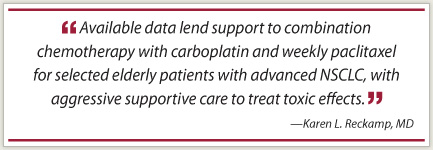Significantly longer median overall survival among elderly patients with advanced non–small cell lung cancer (NSCLC) receiving doublet chemotherapy rather than monotherapy yielded a 36% reduction in mortality risk in a phase III randomized trial. “We saw a survival benefit with doublet chemotherapy of such magnitude that we believe the treatment paradigm for elderly patients with advanced NSCLC should be reconsidered,” stated investigators from the Intergroupe Francophone de Cancerologie Thoracique (IFCT).1
The current treatment paradigm, the investigators noted, recommends monotherapy in patients older than 70 years with advanced NSCLC. Building on subgroup analysis of trials suggesting survival benefits among carefully selected elderly patients receiving combined chemotherapy, investigators conducted a phase III trial (IFCT-0501) to compare monotherapy and platinum-based doublet therapy in this older population. Eligible patients were aged 70 to 89 with unresectable stage IV disease or stage III unsuitable for radical radiation therapy, and World Health Organization (WHO) performance status scores of 0 to 2. The median follow-up was 30.3 months. The results were published in The Lancet online.
A total of 451 patients participated in the multicenter study, with 226 patients randomized to receive four cycles (3 weeks on treatment, 1 week off treatment) of carboplatin (on day 1) plus paclitaxel (on days 1, 8, and 15), and 225 to receive five cycles (2 weeks on treatment, 1 week off treatment) of vinorelbine or gemcitabine (Gemzar) monotherapy. The choice of the monotherapy was left to the discretion of the individual investigator. “We chose carboplatin instead of cisplatin for the doublet chemotherapy regimen to keep toxic effects to a minimum, especially impaired renal function, nausea, vomiting, and peripheral neuropathy, although we recognised an increased risk of thrombocytopenia,” the authors reported. “Weekly paclitaxel was chosen because the regimen is less toxic than and at least as efficacious as a 3-weekly schedule.”
1-Year Survival Exceeds 44%
Median overall survival was 10.3 months for patients receiving doublet chemotherapy and 6.2 months for those receiving monotherapy. The 1-year survival rate was 44.5% in the group receiving doublet therapy and 25.4% in the monotherapy group. Median progression-free survival was 6.0 months for patients in the doublet group and 2.8 months for those in the monotherapy group. The 1-year progression-free survival was 13.4% in the group receiving doublet therapy and 1.8% in the monotherapy group.
At 77, the median age of participants was higher than in other phase III trials specifically looking at NSCLC among elderly patients. “Nevertheless, most of our patients were fit, albeit with a performance status score of 2 in some,” the authors noted. “Our results, therefore, cannot be extrapolated to non-fit elderly patients with poor geriatric indices, for whom other therapeutic options remain to be studied.”
Toxic effects occurred more frequently in the doublet chemotherapy group. The most frequent toxicities were a decreased neutrophil count (affecting 108 patients or 48.4% of the doublet group vs 28 patients or 12.4% of the monotherapy group) and asthenia (affecting 23 patients or 10.3% of the doublet group vs 13 patients or 5.8% of the monotherapy group.
“Grade 3–4 neutropenia, febrile neutropenia, thrombopenia, and anaemia were significantly more frequent among patients in the doublet chemotherapy group than among those in the monotherapy group, as was grade 3–4 sensory neuropathy,” the authors reported. Overall, 177 patients in the doublet chemotherapy group died, 10 attributable to treatment, and 199 patients in the monotherapy group died, 3 attributable to treatment.
Optimum Regimen Remains Unknown
 Citing results from this and other studies, Karen L. Reckamp, MD, of City of Hope Comprehensive Cancer Center, Duarte, California, wrote in an accompanying commentary,2 “Available data lend support to combination chemotherapy with carboplatin and weekly paclitaxel for selected elderly patients with advanced NSCLC, with aggressive supportive care to treat toxic effects. With a median age of 77 years in IFCT-0501 and enrollment of 27% patients with [performance status] 2 in each group, these results can be generalised to a large proportion of patients, although patients had to have adequate renal and hepatic function. Both renal function and hepatic blood flow decrease with age, which could affect clearance, antitumour efficacy, and toxic effects of chemotherapeutic agents.”
Citing results from this and other studies, Karen L. Reckamp, MD, of City of Hope Comprehensive Cancer Center, Duarte, California, wrote in an accompanying commentary,2 “Available data lend support to combination chemotherapy with carboplatin and weekly paclitaxel for selected elderly patients with advanced NSCLC, with aggressive supportive care to treat toxic effects. With a median age of 77 years in IFCT-0501 and enrollment of 27% patients with [performance status] 2 in each group, these results can be generalised to a large proportion of patients, although patients had to have adequate renal and hepatic function. Both renal function and hepatic blood flow decrease with age, which could affect clearance, antitumour efficacy, and toxic effects of chemotherapeutic agents.”
Questions remain about combination chemotherapy vs single-agent treatment in this population, Dr. Reckamp continued. “The appropriate assessment to predict efficacy and toxic effects of therapy has not yet been identified. The optimum chemotherapy regimen remains unknown because previous trials assessed multiple regimens that contained fractionated doses and non-platinum doublets. Older patients dominate the lung cancer population, but continue to be under-represented in clinical trials. Additional studies are needed that enroll adequate numbers of older adults, and include a comprehensive geriatric assessment to provide the knowledge required to properly assess the risk–benefit ratio in treatment decisions so that a personalized approach can be taken,” she concluded. ■
References
1. Quoix E, Zalcman G, Oster J-P, et al: Carboplatin and weekly paclitaxel doublet chemotherapy compared with monotherapy in elderly patients with advanced non-small-cell lung cancer: IFCT-0501 randomised phase 3 trial. Lancet 378:1079-1088, 2011.
2. Reckamp KL: Combination chemotherapy for older adults with advanced non-small-cell lung cancer. Lancet 378:1055-1057, 2011.

